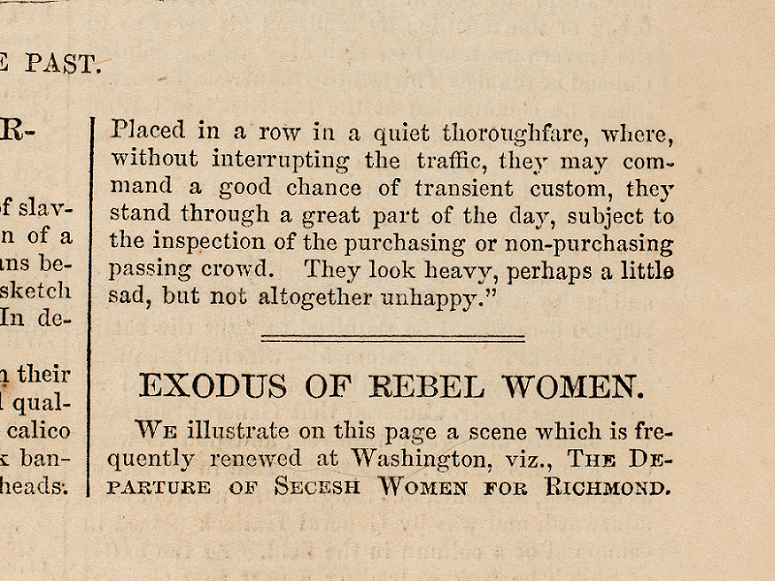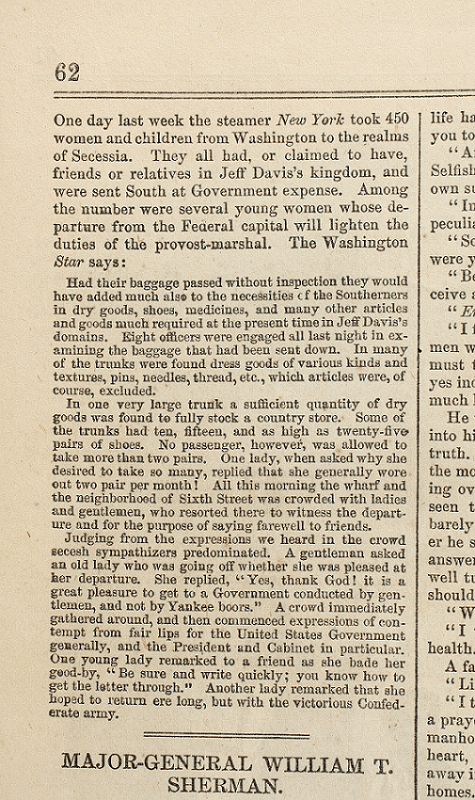Document Text |
Summary |
| Exodus of Rebel Women. | |
| We illustrate on this page a scene which is frequently renewed at Washington, viz., THE DEPARTURE OF SECESH WOMEN FOR RICHMOND. One day last week the steamer New York took 450 women and children from Washington to the realms of Secessia. They all had, or claimed to have, friends or relatives in Jeff Davis’s kingdom, and were sent South at Government expense. Among the number were several young women whose departure from the Federal capital will lighten the duties of the provost-marshal. | This page of the publication has an illustration of Confederate women leaving for Richmond. Last week the steam ship New York took 450 women and children to the South. They all claimed to have family in the Confederate states. The U.S. government paid for their travel. Some of the women tried to smuggle goods to the Confederacy. |
| The Washington Star says: | The Washington Star says: |
| Had their baggage passed without inspection they would have added much also to the necessities of the Southerners in dry goods, shoes, medicines, and many other articles and goods much required at the present time in Jeff Davis’s domains. Eight officers were engaged all last night in examining the baggage that had been sent down. In many of the trunks were found dress goods of various kinds and textures, pins, needles, thread, etc., which articles were, of course, excluded. | Their bags were inspected and a number of necessities were found including: dry goods, medicine, and other goods it is illegal to sell to the Confederacy. Eight officers were sent to examine the baggage. In many of the trunks and bags were fashion and dress items like pins, needles, thread, and other items that were not allowed. |
| In one very large trunk a sufficient quantity of dry goods was found to fully stock a country store. Some of the trunks had ten, fifteen, and as high as twenty-five pairs of shoes. No passenger, however, was allowed to take more than two pairs. One lady, when asked why she desired to take so many, replied that she generally wore out two pair per month! All this morning the wharf and the neighborhood of Sixth Street was crowded with ladies and gentlemen, who resorted there to witness the departure and for the purpose of saying farewell to friends. | In one of the larger trunks, officers found enough items to open a country store. Some trunks had many pairs of shoes. No passenger was allowed to take more than two pairs of shoes. One lady, when asked why she had so many shoes said she wore through two pairs per month! All morning the streets of the Sixth Street neighborhood were crowded with people to say goodbye to those who were leaving. |
| Judging from the expressions we heard in the crowd secesh sympathizers predominated. A gentleman asked an old lady who was going off whether she was pleased at her departure. She replied, “Yes, thank God! it is a great pleasure to get to a Government conducted by gentlemen, and not by Yankee boors.” A crowd immediately gathered around, and then commenced expressions of contempt from fair lips for the United States Government generally, and the President and Cabinet in particular. One young lady remarked to a friend as she bade her good-by, “Be sure and write quickly; you know how to get the letter through.” Another lady remarked that she hoped to return ere long, but with the victorious Confederate army. | Judging by the crowd’s reaction to the departure, there were Confederate sympathizers in the crowd. A gentleman asked a lady if she was happy to be leaving and she said that it would be good to go to a place where the government was made up of gentlemen instead of Yankees. The crowd expressed anti-United States government sentiments and specifically called out the President and the Cabinet. One young lady told her friend to write her quickly and suggested that her friend would know how to smuggle a letter to her. Another lady said she hoped to return soon, but with the Confederate Army. |
“Exodus of Rebel Women,” Harper’s Weekly, January 24, 1863, New-York Historical Society Library.
Background
At the outset of the Civil War, the Union established a blockade around the Confederacy. This prevented the Confederacy from trading for many of the supplies needed to survive the war. Skilled blockade-runners could make it through the lines of Union ships, but they could only carry a small portion of the goods needed by a country at war.
Confederate women took on the role of smuggling for the Confederacy. Nineteenth-century social conventions led Union soldiers to assume that all women were innocent noncombatants. This made it easier for Confederate women to transport medicine, letters, food, and other much-needed supplies across the border. It was only in 1863—two years into the war—that the Union Army fully recognized the threat and began to crack down on women’s movements in war zones.
About the Document
This Harper’s Weekly article recounts a smuggling incident in Washington, D.C., in January 1863. A group of Confederate women who had been stranded in the U.S. capital when the war broke out asked the Union government to help them return to their husbands and families. The government agreed to arrange the journey and cover their expenses. Instead of packing their belongings, the women filled their luggage with medicine, food, and shoes. They were discovered when their luggage was inspected. The U.S. government confiscated the goods, but the women were allowed to continue on their journey. The humorous tone of the article indicates that the Union public did not yet take the threat of women smugglers seriously.
Vocabulary
- blockade: When one nation surrounds another with troops or ships to prevent trade with other countries. The Union blockade of the Confederacy during the Civil War was mostly at sea.
- blockade runner: A person who sneaks goods through a blockade.
- boors: Men with bad manners.
- commenced: Began.
- Confederacy: The group of states that seceded from the United States before the Civil War in order to preserve slavery.
- contempt: Disrespect.
- dry goods: Fabric, thread, or clothing.
- ere: Before.
- excluded: Confiscated.
- Harper’s Weekly: A weekly newspaper produced in the Union.
- Jeff Davis: Jefferson Davis, president of the Confederacy.
- predominated: Were the majority.
- provost-marshal: Head of the military police.
- resorted: Hung around.
- Secesh: Secessionist or Confederate.
- Secessia: The Confederacy.
- steamer: A ship powered by steam.
- Union: The name for the states that remained a part of the United State during the Civil War.
- viz.: In other words.
- wharf: Dock.
Discussion Questions
- Why was smuggling critical to the Confederate war effort?
- Why were women more easily able to smuggle goods for the Confederacy?
- What does this article reveal about the Union attitude toward women smugglers and the Confederacy in general?
Suggested Activities
- Use this document to supplement any lesson about the Confederate economy and war shortages.
- Combine this article with General Halleck’s 1863 war order to understand how the actions of Confederate women during the American Civil War forced a lasting change in the international rules of war.
- To help students better understand the dire circumstances facing the Confederacy as a result of the Union blockade, have them examine the engravings in Scenes from the Confederate Home Front and read the life stories of Emily Jane Liles Harris and Ella Gertrude Clanton Thomas.
- For a larger lesson about the ways women contributed to Union and Confederate war efforts during the American Civil War, teach these resources together with any of the following: Life Story: Sojourner Truth, Nursing, Sanitary Fairs, Women’s War Production, Women Soldiers, Scenes from the Confederate Home Front, Changing the Rules of War, Life Story: Elizabeth Blackwell, Life Story: Emily Jane Liles Harris, Life Story: Loreta Janeta Velázquez, Life Story: Harriet Tubman, Life Story: Susie Baker King Taylor, and Swearing Loyalty.
- For more on women spies and smugglers in American history, explore: Life Story: Lorenda Holmes and Negotiating the Surrender of New Netherland.
- For an in-depth lesson on the experiences of women in the Confederacy, combine this resource with any of the following: Surviving the Siege of Atlanta, Scenes from the Confederate Home Front, Changing the Rules of War, Civil War Political Cartoons, Cherokee Home Front, Swearing Loyalty, Life Story: Emily Jane Liles Harris, Life Story: Loreta Janeta Velázquez, Life Story: Ella Gertrude Clanton Thomas.
Themes
WORK, LABOR, AND ECONOMY









